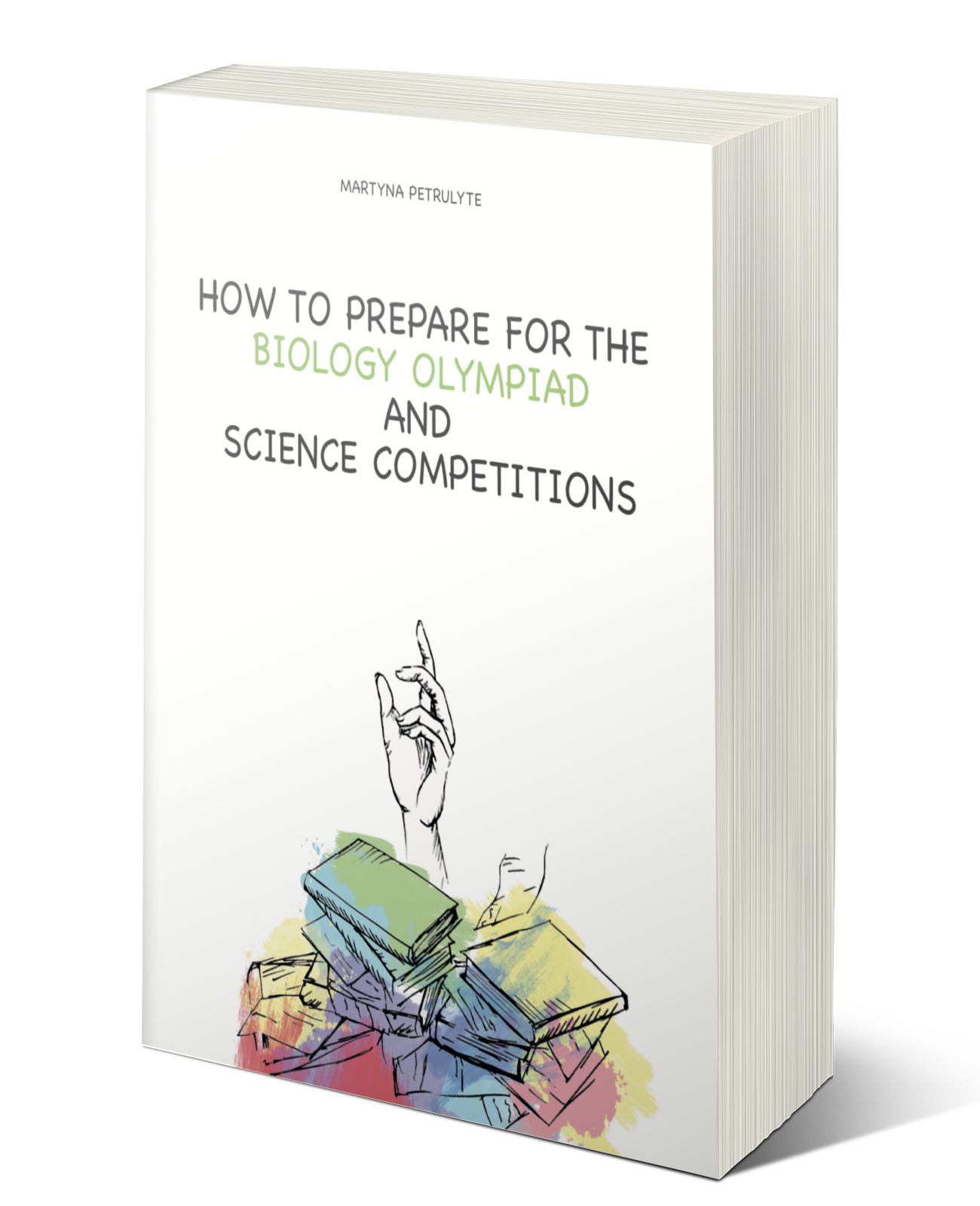Every day I receive many emails asking what the best textbooks are for the biology olympiad. To be honest, there is no one single answer. It goes without saying that the more you read, the more you know, the easier you will answer the questions thrown at you during the biology olympiad.

So what should you read after all?
Well, there are many good books, both general and more specific and it is up to you to choose which ones to read. In general, I would recommend find one book for each of the following topics:
- General biology
- Biochemistry
- Molecular biology
- Genetics
- Human anatomy and physiology
- Plant biology
- Ecology and Ethology
- Practical skills in bimolecular sciences
- Zoology
This kind of means that you will need to read at least 9 textbooks. Let me suggest you some good textbooks that I read when I was preparing for the biology olympiad.
General Biology
Campbell Biology is the standard textbook that is most commonly recommended to anyone who wants to start preparing for the biology olympiad. It is useful for both regional and national level of the competition. But…Campbell is not enough if you really want to nail the olympiad.
Wait what???
See, the problem is that the biology olympiad has been running for a number of years and many of the questions from Campbell have already been asked. Obviously, if you want to be better then your peers, you need to tap into other resources.
Life: The Science of Biology by David Sadava et al. is another general biology book that is similar to Campbell’s but it contains slightly different information as well as more comprehensive images and diagrams.
I personally adore Biology by Raven et al. Raven interestingly presents some more advanced biology topics that are not covered in Campbell. Here you can find some nice chapter examples from Raven’s Biology book.
Biochemistry
Biology is nothing without chemistry so you need to know the basics of chemistry as well. My favourite book is the Color Atlas of Biochemistry by Jan Koolman, K. Rohm. It is a pocket-size concise book (approximately 400 pages). What I like most about this book is that every page on the left contains theoretical part and every page on the right depicts diagrams, illustrations, graphs and so on. So, if you remember better by looking at illustrations, I highly recommend to read this little textbook.
Another very useful book is Biochemistry (Lippincott Illustrated Reviews Series) by R. Harvey. It is designed for medical students and therefore is very concise but informative.
Many past participants recommend the Lehninger Principles of Biochemistry, however, I used this book in my 2nd and 3rd year of the university and honestly I find this book too detailed for the biology olympiad.
Molecular biology
I would like to suggest the best book for molecular biology, Molecular Biology of the Cell by Bruce Alberts, et al. This book is a big one, a hard one, an interesting one, a useful one. In my opinion, current and upcoming IBOs are focusing more and more on molecular and cell biology. Reason being these fields require more critical and analytical thinking and are not as theory dense as say anatomy.
If you want something cheaper than Alberts but equally useful, try Molecular Biology of the Cell, Fifth Edition: The Problems Book. The Problems Book helps students appreciate the ways in which experiments and simple calculations can lead to an understanding of how cells work by introducing the experimental foundation of cell and molecular biology. Each chapter will review key terms, test for understanding basic concepts, and pose research-based problems. The Problems Book has been designed to correspond with the first twenty chapters of Molecular Biology of the Cell, Fifth Edition.
Genetics
Genetics: Analysis and Principles (WCB Cell & Molecular Biology) by Brooker presents an experimental approach to understanding genetics. What I like most about this book is that there are plenty of problems with explanations and answers. What is more, various laboratory methods are depicted in diagrams so you do not need to work in a lab to get essential practical skills (of course, it is better to do some practice in lab so that not to fail in IBO practical part). Here you can get a better grasp of what is in this textbook.
Another good textbook for genetics is Genetics: From Genes to Genomes, 5th edition by Hartwell. It is as big as other books but goes into greater detail of key concepts.
Human anatomy and physiology
For the human body anatomy and physiology, I would recommend some great books like Human Physiology: An Integrated Approach (7th Edition)by Dee Unglaub Silverthorn or Vander’s Human Physiology
.
The newly revised Human Physiology: An Integrated Approach Fourth Edition strengthens the coverage of the “big picture” themes in the study of physiology and helps tie concepts together in a logical framework for learning.
Vander’s Human physiology reflects some of the major themes of the textbook: homeostasis, exercise, pathophysiology, and cellular and molecular mechanisms of body function. You can take a look at one of the chapters of this book here.
I also read Human Physiology: From Cells to Systems by Sherwood. This book is meant for the one-semester Human Physiology course typically taken by allied health and biology students. The start chapters introduce basic chemical and biological ideas to offer students with the framework they should comprehend physiological principles. Moreover, the chapters promote conceptual understanding.
Plant biology
Many past IBOs contained quite a lot of questions about plant anatomy and physiology. So I suggest for plant biology to read Stern’s Introductory Plant Biology.
Another amazing book for plant biology is Biology of Plants by Peter H. Raven, Ray F. Evert, Susan E. Eichhorn. It cover the major chapters like plant anatomy, reproduction, water and sugar transport, phylogeny and plant responses to external stimuli.
Ecology and Ethology
By far the best book for ecology is the new fourth edition of Ecology which provides an easy-to-read and well-organized text for instructors and students to explore the basics of ecology. This edition also continues with an increasing emphasis on enhancing student quantitative and problem-solving skills. A new Hone Your Problem-Solving Skills series has been added to the set of review questions at the end of each chapter. The questions expose students to hypothetical situations or existing data sets, and allow them to work through data analysis and interpretation to better understand ecological concepts.
For ethology, check Principles of Animal Behavior which has long been considered the most current and engaging introduction to animal behavior. The Third Edition is now also the most comprehensive and balanced in its approach to the theoretical framework behind how biologists study behavior.
Practical skills in bimolecular sciences
As far as the practical part of IBO is concerned, I have not found a better book than Practical Skills in Biomolecular Science, 5th ed. by Rob Reed. This textbook underpins any practical course in biochemistry, biomedical science, genetics, immunology and microbiology. Not only it includes numerous exercises with answers, but also fosters study and examination skills, laboratory and analytical skills, investigative techniques and analysis of experimental data. Some students also recommend Biochemistry, 4th Edition
by Donald Voet, Judith G. Voet but this one is as comprehensive (and as big) as Lehninger’s.
Modern Biology: Skills Practice Labs: Includes Dissection Labs is a nice book to develop practical skills as well.
For microbiology, I would suggest Brock Biology of Microorganisms (14th Edition). This book for biology, microbiology, and other science majors balances cutting edge research with the concepts essential for understanding the field of microbiology.
Another good book for practical skills is Molecular Biology of the Cell, Fifth Edition: The Problems Book.
Zoology
For animal biology you should read Biology of Animals by Cleveland P. Hickman Jr., Larry S. Roberts, Allan Larson or Animal Physiology
by Richard W. Hill, Gordon A. Wyse, Margaret Anderson.
Animal Physiology presents all the branches of modern animal physiology with a strong emphasis on integration of physiological knowledge, ecology, and evolutionary biology.
Biology Of Animals presents coverage of animal form, function, diversity and evolution. In this sixth edition, the cladistic perspective (phylogenetics systematics) has been added to the discussion of animal phyla, and cladograms of the relationships are included.
My personal favourite is Integrated Principles of Zoology by Hickman. It is a big book, just like Campbell but it covers all animal groups in great detail. This is the perfect book for the practical part of biology olympiad.
Biology Olympiad Strategies
Science competitions test a student’s level of knowledge, power of scientific reasoning, and analytical thinking outside of the regular school curriculum. A systematic approach and smart study regimen are both required to get good results in science competitions. How To Prepare for the Biology Olympiad And Science Competitions by Martyna Petrulyte will help you succeed in science olympiads.
In this book, you will find many tips and tricks for how to study and prepare for science olympiads. Moreover, you will learn how to:
• boost your motivation
• cope with failures and anxiety before the tests
• defeat procrastination
• manage your time
• memorize information quicker and more effectively
• organize your study material
• read a science textbook
• plan your study schedule
• develop practical skills
• get into and survive in the lab.
Furthermore, you will find essential test-taking strategies for tackling the olympiad exams and example-based tips on how to develop critical thinking and problem solving skills.

To end with, I have created a study schedule that you can access here which includes weekly reading assignments from the textbooks for each above mentioned topic.
Good luck!
Best wishes,
Martyna
Image source: https://www.freepik.com/vectors/reading-illustration vector created by storyset

